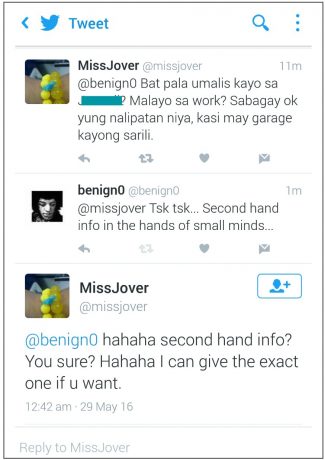
According to the latest Western media feature, “popular” Filipino blogger Jover Laurio worked for an Australian call centre before her rise to “fame” as blogger and “thought leader” of the Philippine Opposition. This is particularly relevant to me as Laurio had some time ago used information she had somehow obtained about my private residence and even telephone number to issue threats against me. Indeed, the information seems to have been shared with many of her followers and allies in social media as the information was presented to me as part of veiled threats many times over the years.
It is likely that the call centre Laurio works for serves Australian incumbent telecommunications company Telstra. I recall that some of the threats she and her cohorts addressed to me made reference to telephone bills. If this is the case, Telstra should investigate whether Australian privacy laws had been violated both by Laurio and her former employer in the course of obtaining and distributing my private information.
Australian Privacy Principle (APP) 6 of the Australian Privacy Act 1988 prohibits an entity from “using or disclosing personal information for a purpose other than the purpose for which it was collected, unless the individual consents, the individual would reasonably expect their personal information to be used for the secondary purpose, or another prescribed exception applies.” Furthermore, APP 8 stipulates…
If an APP entity is to disclose personal information to an overseas recipient, APP 8 requires it to take reasonable steps to ensure the recipient does not breach the APPs. This usually requires the APP entity to impose contractual obligations on the recipient.Relevantly, if the overseas recipient does breach the APPs, the Privacy Act imposes liability on the APP entity that made the overseas disclosure.

This means there is opportunity to investigate possible breaches of privacy from Australia as a business entity based in Australia that had transmitted private information of its Australian clients to an overseas subsidiary or contractor — such as, in this case, a call centre operator to which it outsourced some of its operations — could be held liable for said breach.
Much had already been written with regard to the hypocrisy surrounding the way the Philippine Opposition had propped up Laurio as a “hero” in a so-called fight against an imagined tyrannical Philippine government. The fact is, however, even though much had been written about Laurio herself, there is scant material to be found about the actual content that she publsihes on her much-vauntedPinoy Ako Blog (PAB) itself — except for one noted blogger, Katrina Stuart Santiago, who actually took the time to mount a critical evaluation of Laurio’s work on PAB. In her piece, State of blogging, microblogging, media #crisis, Stuart-Santiago writes how “anyone who even spends time reading through Laurio’s site would find that she employs exactly the same tools, the same tone, the same kabastusan [crassness] that we find offensive in the DDS microblogs and fake news-propaganda sites.” She goes further to write about Laurio’s intellectual dishonesty on exhibit in her work published on PAB…
Laurio has entries that are but a series of questions dripping with malice and insinuations that are based on unnamed sources; she calls out Duterte officials and ends by saying versions of: “Sana hindi po ito totoo …” or “Kung mali ako …” Both these strategies are used by Duterte propagandists. These are no different from Asec Mocha using the world “allegedly” when she used to make her baseless accusations (she’s been very careful to keep from doing that of late), and ending her criticism of Liberal Party Senators, or mainstream media, with “Nagtatanong lang po!”
And on Laurio’s being the foremost celebrated Resibo Queen (a reference to the screencaps she uses as “proof” for her “fact checks” in her “fight” against “fake news”), Stuart Santiago is dismissive…
Laurio does not hyperlink to her sources — something that RJ Nieto (one of her favorite nemesis) actually takes seriously — and I’ve caught her often enough leaching off other Facebook pages’ content and passing the content off as her own. She then gets comments like “ang talas talaga ng mata mo Pab!” Yet the same information was posted on the Facebook page of We Are Collective days before she even put it on her blog.
It is quite rich that no less than the New York Times would toe the Philippine Liberal Party line by featuring her as a “hero” on their illustrious pages and website. Laurio, like her idol Rappler CEO Maria Ressa is a fake hero. Their prowess with playing the Victim Card no longer fools Filipinos. Unfortunately, they had succeeded at fooling the editors of the New York Times. For its part, the Times seems to have succumbed to the temptation presented by a juicy story without applying basic journalistic rigour, like taking into account alternative sources on the matter of Laurio’s new-found public profile. This latest piece is notable for an absence of the points of view of supporters of the incumbent Duterte government. Now that is being a hypocrite.
No comments:
Post a Comment